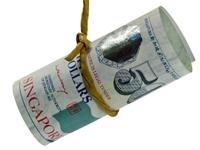
Moody's: Singapore monetary policy tightening positive for banks
Country's 3 biggest domestic banks will mostly benefit from the increasing interest rates.
Extracted from “Moody’s Weekly Credit Outlook”, April 19, 2010 by Christine Kuo, Vice President & Senior Analyst, Moody’s Investors Service
Last Wednesday, after first-quarter GDP surged 32.1% over the prior quarter, the Monetary Authority of Singapore (MAS) tightened monetary policy. The move is credit positive for banks operating in Singapore as it will lead to increasing interest rates, which generally benefit banks’ net interest margins. Moreover, banks are expected to report stronger loan growth and improving asset quality thanks to a robust operating environment.
Singapore runs its monetary policy based on an undisclosed band for the SGD nominal effective exchange rate (S$NEER). It alters and effects monetary policy by moving the band up or down. Last week, MAS re-centered the exchange-rate policy band upward at the prevailing level of the S$NEER and shifted it to a modest and gradual appreciation , away from the zero-percent appreciation it had maintained since October 2008.
Singapore’s three domestic banks, namely DBS Bank, Oversea-Chinese Banking Corp, and United Overseas Bank, will benefit most from rising interest rates because their loan-to-deposit spreads will widen as loans generally re-price faster than customer deposits. Furthermore, higher interbank rates will generate better yields for investment of their surplus funds.
Foreign banks that rely on wholesale funds will do less well. Their loan-to-deposit spreads should increase too, but the benefits will be partially offset by a higher cost of funds since they will need to borrow at higher interbank rates.
Singapore banks will see higher loan demand from most business sectors, possibly including exporters. Exports are important to Singapore’s economy and they could be hurt by SGD appreciation, but most other Asian currencies are also appreciating versus the USD (see the exhibit below) so the relative competitiveness of Singaporean exporters is likely to remain largely unchanged.
Because we believe the interest rate hike will be gradual, we are not concerned about bank asset quality suffering because of the increased payment burden on borrowers. Robust economic activity and falling unemployment will improve corporate and household earnings, which should lead to improving asset quality, as we have seen during previous periods of economic growth.
The government also said last Wednesday that the Singaporean economy had fully recovered output lost during the recession, and that economic activity in a broad range of industries had exceeded its pre-crisis peak when it announced 32.1% quarter-on-quarter growth in first-quarter GDP. It also revised upward the 2010 economic growth forecast to 7.0%-9.0% from 4.5%-6.5%.
























 Advertise
Advertise






